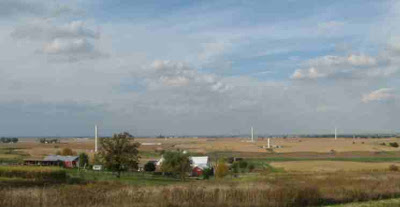Home Energy Makeover
A video from Focus on Energy and Fox 6 on cutting energy costs by adding installation and sealing air leaks in a home.
A video from Focus on Energy and Fox 6 on cutting energy costs by adding installation and sealing air leaks in a home.

 Towers await turbines at EcoEnergy‘s EcoGrove wind project near Lena, Illinois.
Towers await turbines at EcoEnergy‘s EcoGrove wind project near Lena, Illinois.
From a media release issued by Alliant:
MADISON, WI – October 17, 2008 – A decision on the future of the Nelson Dewey Generating Station is just weeks away. The final phase of the regulatory process kicked off today, as Wisconsin Power and Light Company (WPL), a subsidiary of Alliant Energy Corporation (NYSE: LNT), filed its . . . brief in the case.
The brief highlights that no generating facility in Wisconsin history has ever provided the varied benefits that Nelson Dewey 3 will bring. These benefits include helping to jump start the biofuels economy in Wisconsin and establishing an estimated $50 million dollars annually in economic development from that market, creating much-needed jobs for southwest Wisconsin during the construction and operation of the plant, and increasing the transmission import capability into the state by as much as 600 megawatts.
Also addressed in the brief is the importance of strong ratemaking principles to the project. Ratemaking principles define how construction costs will be recovered in utility rates throughout the life of the generating facility. “These are clearly challenging economic times for all of us,” said William D. Harvey, Chairman, President, and CEO – Alliant Energy. “We are thankful that, in Wisconsin, our regulators have the ability to fix the financial parameters for the lifetime of the project. That certainty can help provide our customers and our company with stability, which, now more than ever, is critical.”
The proposed 300 megawatt plant will have the ability to burn not only coal, but also switchgrass (native prairie grass), corn stalks and waste wood from area fields and forests. The Public Service Commission of Wisconsin (PSCW) is considering WPL’s proposal, with final briefs in the docket due at the end of this month. The PSCW is expected to issue an oral decision about the future of the project in mid-November, with a written order due in mid-December.


The all-electric vehicles from Columbia ParCar offer one transportation
alternative to the internal combusion engine. (Photo courtesy of
Columbia ParCar, Reedsburg, WI.)
From an editorial in The Thomah Journal:
For all the attention the banking and insurance bailouts have received — and anything that involves $1 trillion of taxpayer money deserves attention — it’s only a short-term fix to what ails the American economy and American living arrangements. To solve its long-term problems, America needs a new sustainability agenda.
Unfortunately, discussions of sustainability are limited to the poor and whether it’s possible, for example, to guarantee adequate health care for everyone. That’s a very narrow definition. We need a broader view of sustainability that examines:
* Mobility. Exurban lifestyles in which people live in big houses and drive big automobiles to jobs located 30, 40 or 50 miles away impose a huge cost on the economy and environment. We need an agenda of sustainable neighborhoods that require us to drive fewer miles — or not at all — to meet basic needs.
* Energy. It’s unclear how much oil lies beneath the earth’s surface, but this much is beyond dispute: oil is a finite resource, and it will run out some day. It’s not too early to invest in clean, renewable energy sources and develop an alternative to the internal combustion engine. . . .
A nation that can massively subsidize exurban sprawl, non-renewable energy, corporate farms and pre-emptive war is capable of sustaining a sturdy safety net for our sickest, poorest and most vulnerable citizens. It’s just a matter of leaders adopting a new vision of what’s sustainable and what needs to change.
From a story by Mark McPherson on WKBT, La Crosse:
Every day, Gundersen Lutheran works to help patients get better. Now through a new initiative they are working to help the enviroment as well.
Gundersen Lutheran’s Going Green program is something they say makes sense for everyone. “We can improve our enviroment and reduce the cost of our operation at the same time,” said Gundersen Lutheran Senior V.P. of Business Services Jerry Arndt. Arndt feels it’s especially important for a hospital to try and save energy considering how much they consume. “Hospitals use 2 1/2 times more energy than a commercial office building would for example,” said Arndt.
The program will include small changes like turning off lights and computers, but includes bigger initiatives like solar panels on the new parking ramp and using methane emissions from the City Brewery to create electricity.